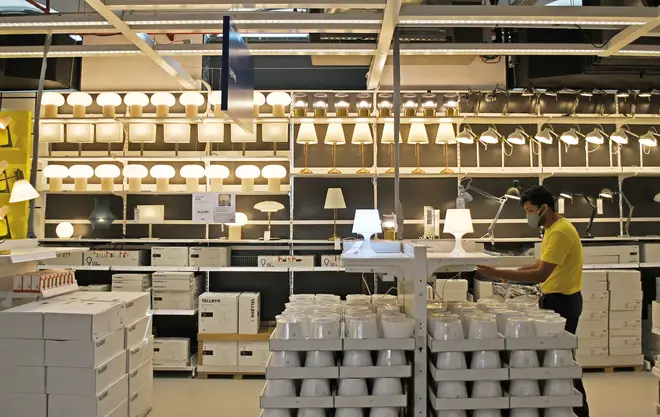
Nick Abbot 12am - 1am
10 January 2022, 16:39 | Updated: 10 January 2022, 16:40

Ikea has cut the sick pay of workers who are unvaccinated against coronavirus.
Unjabbed staff who have to self-isolate after coming into contact with a Covid case could receive a basic rate of £96.35 a week, the Statutory Sick Pay (SSP) minimum.
The furniture retailer, which employs 10,000 staff in the UK, has said they will consider "mitigating circumstances."
The chain said in a statement: "Fully vaccinated co-workers or those with mitigating circumstances will receive full pay for self-isolations.
Read more: Wilko plans to close 16 branches this year in 'nail in the High Street's coffin'
"Unvaccinated co-workers will be paid in line with our company absence policy for self-isolation, with close-contact isolation being paid at Statutory Sick Pay.
"We appreciate that this is an emotive topic and all circumstances will be considered on a case by case basis, therefore anyone in doubt or concerned about their situation is encouraged to speak to their manager."
Philip Richardson, partner and head of employment law at law firm Stephensons said: “Ikea’s decision highlights a shift in the way in which organisations are now approaching the pandemic, particularly those which are service led and reliant on staff being in stores, offices or in people’s homes.
"Many have reached a point of intense pressure when it comes to staffing and costs and it is highly likely that other firms will follow suit over the coming weeks as they try and navigate this surge in cases.”
Yesterday it emerged a major London hospital could lose 1,000 staff members if they do not get vaccinated.
The head of King's College Hospital (KCH) Dr Clive Kay accepted he was "worried" by the fact that around 10% of approximately 14,000 workers at the hospital are yet to receive a first dose.
Dr Kay said his job was to "encourage staff to get vaccinated" after Sajid Javid was questioned by Steve James, a consultant anaesthetist on the ICU ward, during a visit to the hospital.
The consultant had told the Health Secretary he disagreed with the Government's decision to make vaccinations mandatory for NHS hospital workers, saying the science was not strong enough to support the move.
Dr Kay refused to comment on "individual cases" but said it was a "moot point" whether or not the measures were fair, as they were now matters of law.
Senior staff at KCH are now ramping up efforts to encourage hospital workers to get jabbed as the deadline for them to receive a first dose approaches, he said.
In December, MPs approved mandatory vaccinations for NHS and social care staff by April this year.
More than 1,000 members of staff could be lost in an "extreme" scenario unless vaccine uptake within the workforce improves, Dr Kay said.
Asked whether he was worried, Dr Kay said: "Yes, of course. I think my job is to worry, my job is to worry about everything in relation to whether or not we have enough staff here to provide care for patients and will continue to do so, and we will provide care for patients but ultimately if individuals choose not to (it's) their choice," he said.
Education Secretary Nadhim Zahawi also backed the requirement for NHS staff to be vaccinated despite staff shortages and the anaesthetist's challenge to Mr Javid.